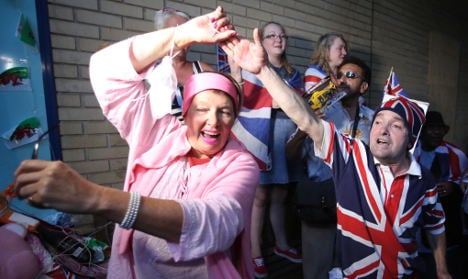The waiting for a young woman to give birth to her first child – inevitably dubbed the Kate Wait by the British media, a gambit copied by the Germans – seemed to go on forever. The Süddeutsche Zeitung suggested the week was as chewy as gum for the Brits waiting for the third in line to the throne.
Bild had for days carried a constantly updated ‘Is the baby born yet?’ strap on its website, with a pram swooping across the page only to be followed by the answer: Nein. When the Duchess of Cambridge went into hospital on Monday morning, the paper’s website carried a live feed of the front door of the hospital.
The anticipation obviously overwhelmed Bild editors for a while, as they filled the page with the declaration that looking at the closed door of a hospital was more exciting than Wimbledon.
The huge headline “Windeldon” mashed the almost randomly chosen words Windeln – nappy – and Wimbledon. Were they being clever to include the first part of the name Windsor in that too? Or was that just a happy accident?
By the evening, with the baby safely born, a curious click on Bild.de resulted in a startling baby cry as the tech wizards went mad with joy and embedded audio into the page. The paper soon swung into action with wild claims of “What will probably happen today” including seeing the baby and Kate speaking in public. The live feed from in front of the hospital continued though – presumably waiting for the new little family address their adoring international public.
Readers were also urged to send in their suggestions for names – just in case the British royal family were stuck and decided to check the German tabloid paper for inspiration.
Headline writers in Germany of course have a whole different vocabulary with which to play.
Der Spiegel reported on Monday that the British nation was in labour… with Nation in den Presswehen. Presswehen means labour, but literally means ‘push pains’ but could also be referring to the excruciating efforts of some 24-hour media in filling space and time while a woman underwent labour out of their sight.
Once the baby prince had arrived the magazine duly dumped the future of the monarchy on his little newborn head, saying he follows the footsteps of his parents in sparking a wave of monarchism in the UK – in the media at any rate, the magazine said.
Yet trying to straddle different languages and cultures can also be a tricky business – as Die Welt demonstrated. On Monday it carried an entire article about how with every contraction, the Duchess became one of the workers – because of the English word labour used to describe giving birth.
It talked about delight sweeping across the British Isles when it was announced earlier this year that Kate would not be too posh to push, but would opt for a natural birth.
“Perhaps it is also this word labour that so unites the British in their joyful expectation of the royal baby, and for a moment erases the class barriers – Kate has become a worker,” the paper suggested.
The left-wing Tageszeitung newspaper proclaimed “It’s a Baby” on Tuesday, and suggested the supposedly delayed birth was due to the child being hesitant to join the world in the full knowledge that the British nation would be following his every move.
It also quoted Justin Welby, Archbishop of Canterbury, who said, “In the north east of the country more companies are going bankrupt than anywhere else. In Afghanistan we are fighting a difficult war with remarkable courage. But even for those who are fighting to survive and are suffering, the birth is good news.”
Welcome to the world, baby, the paper concluded.
The Local/hc



 Please whitelist us to continue reading.
Please whitelist us to continue reading.
Member comments